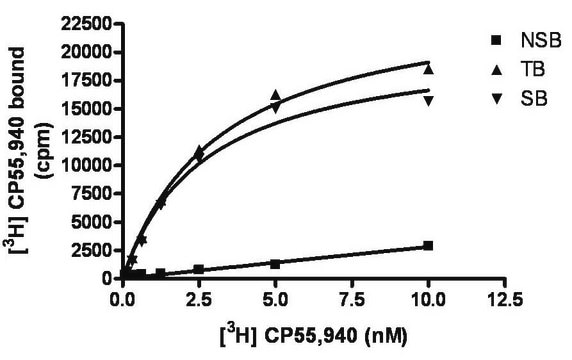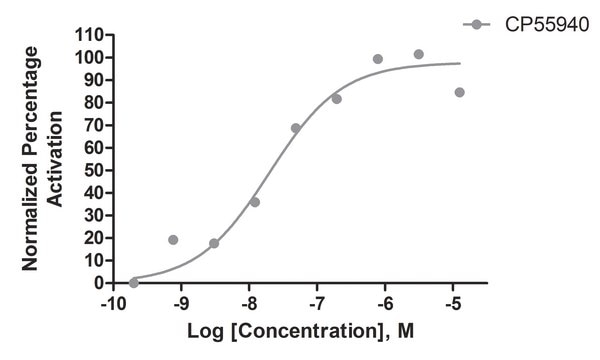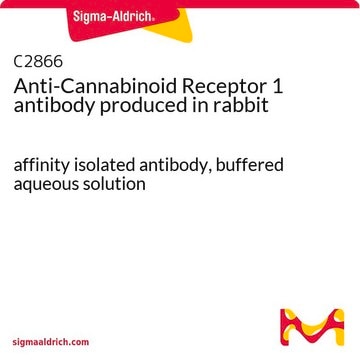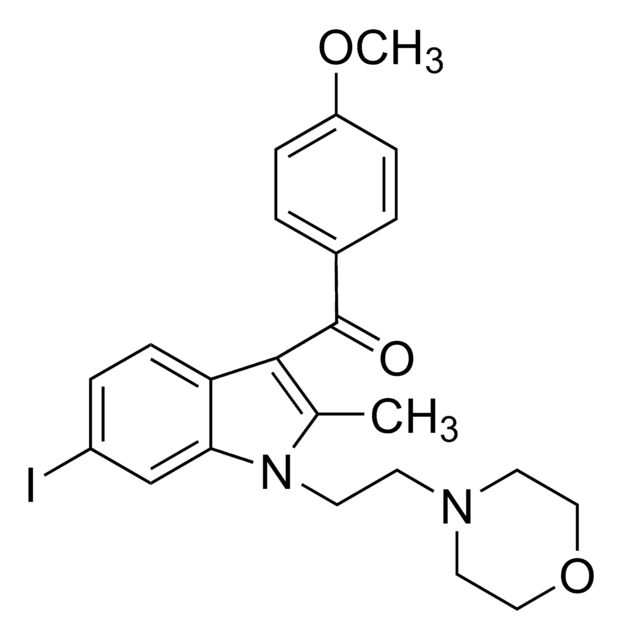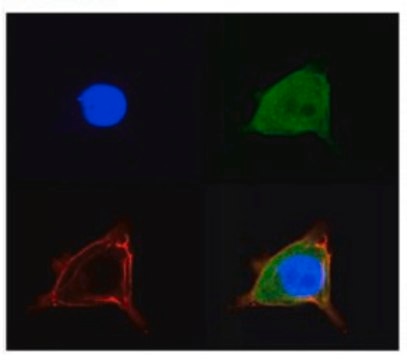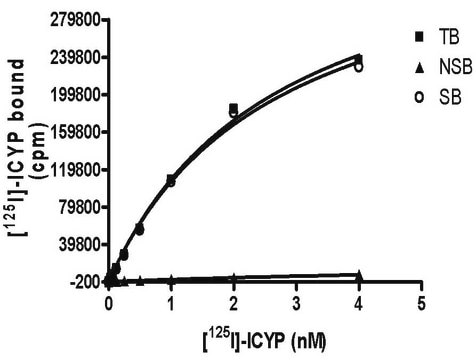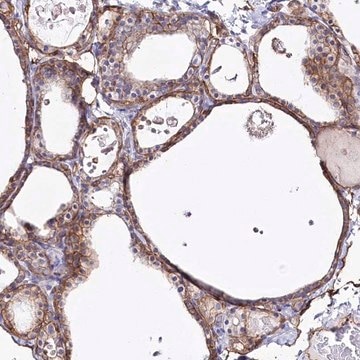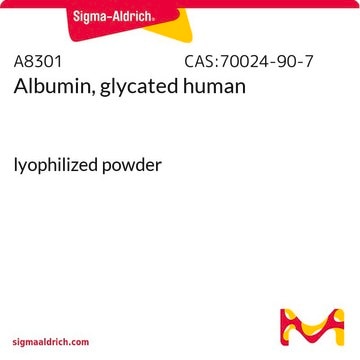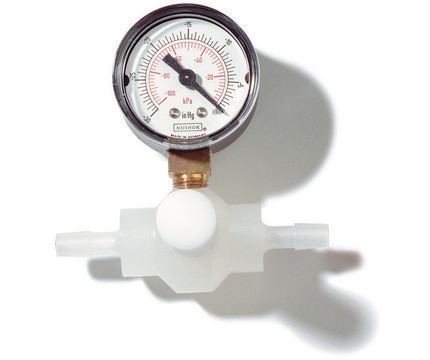HTS019M
ChemiSCREEN CB1 Membrane Preparation
Human CB1 GPCR membrane preparation for Radioligand binding Assays & GTPγS binding.
Synonym(s):
CB1 GPCR-expressing membrane prep
Sign Into View Organizational & Contract Pricing
All Photos(2)
About This Item
UNSPSC Code:
41106514
eCl@ss:
32161000
NACRES:
NA.41
Recommended Products
biological source
human
Quality Level
recombinant
expressed in Chem-1 cells
manufacturer/tradename
ChemiScreen
Chemicon®
concentration
1.0 mg/mL
technique(s)
ligand binding assay: suitable (GTPγS)
radioligand binding assay (RLBA): suitable
NCBI accession no.
UniProt accession no.
shipped in
dry ice
General description
CB1 is a GPCR that is expressed primarily in brain and nervous tissue, and mediates numerous CNS responses such as analgesia, appetite, cognition, memory and locomotor activity. A number of cannabinoid ligands bind to CB1 and activate Gi/o-mediated downstream responses, including inhibition of cAMP production and activation of ion channels and MAP kinases. Ligands for CB1 include exogenous agonists such as Delta9-THC, the main psychoactive component of the plant Cannabis sativa, and endogenous eicosanoid agonists such as anandamide. A number of synthetic agonists such as CP55940 and R-(+)-WIN55212, and antagonists, such as SR141716A, for CB1 have been developed (Howlett et al., 2002). CB1 agonists have clinical utility in analgesia and antiemetic properties, whereas CB1 antagonists show promise for treatment of appetite in obesity disorders. Chemicon′s CB1 membrane preparations are crude membrane preparations made from our proprietary stable recombinant cell lines to ensure high-level of GPCR surface expression; thus, they are ideal HTS tools for screening for agonists and antagonists at CB1. The membrane preparations exhibit a Kd of 7 nM for [3H]-SR141716A. In the presence of 2 nM [3H]-SR141716A with CP55940 as unlabeled competitor, 5 μg/well and 10 μg/well CB1 Membrane Prep yield 4- and 5-fold signal-to-background ratios, respectively.
Human CB1
Application
Human CB1 GPCR membrane preparation for Radioligand binding Assays & GTPγS binding.
Radioligand binding assay, and GTPγS binding.
Biochem/physiol Actions
GPCR Class: A
Protein Target: CB1
Target Sub-Family: Cannabinoid
Quality
SPECIFICATIONS:
1 unit = 10 μg
Bmax: 15 pmol/mg
Kd: 7 nM for SR141716A
1 unit = 10 μg
Bmax: 15 pmol/mg
Kd: 7 nM for SR141716A
Specifications
Inucbation Conditions
RECOMMENDED ASSAY CONDITIONS: Membranes are mixed with radioactive ligand and unlabeled competitor (see Figures 1 and 2 for concentrations tested) in binding buffer in a nonbinding 96-well plate, and incubated for 1-2 h. Prior to filtration, a GF/C 96-well filter plate is coated with 0.33% polyethyleneimine for 30 min, then washed with 50mM HEPES, pH 7.4, 0.5% BSA. Binding reaction is transferred to the filter plate, and washed 3 times (1 mL per well per wash) with Wash Buffer. The plate is dried and counted.
Binding buffer: 50 mM Hepes, pH 7.4, 5 mM MgCl2, 1 mM CaCl2, 0.2% BSA, filtered and stored at 4°C. Ligands were diluted in binding buffer containing 30% DMSO, then added to membranes such that the final DMSO concentration was 15%.Radioligand: [3H] SR141716A (Amersham #TRK1028)
Wash Buffer: 50 mM Hepes, pH 7.4, 500mM NaCl , 0.1% BSA, filtered and stored at 4°C.
One vial contains enough membranes for at least 200 assays (units), where an unit is the amount of membrane that will yield approximately 4-fold signal:background with [3H] SR141716A at 2 nM
RECOMMENDED ASSAY CONDITIONS: Membranes are mixed with radioactive ligand and unlabeled competitor (see Figures 1 and 2 for concentrations tested) in binding buffer in a nonbinding 96-well plate, and incubated for 1-2 h. Prior to filtration, a GF/C 96-well filter plate is coated with 0.33% polyethyleneimine for 30 min, then washed with 50mM HEPES, pH 7.4, 0.5% BSA. Binding reaction is transferred to the filter plate, and washed 3 times (1 mL per well per wash) with Wash Buffer. The plate is dried and counted.
Binding buffer: 50 mM Hepes, pH 7.4, 5 mM MgCl2, 1 mM CaCl2, 0.2% BSA, filtered and stored at 4°C. Ligands were diluted in binding buffer containing 30% DMSO, then added to membranes such that the final DMSO concentration was 15%.Radioligand: [3H] SR141716A (Amersham #TRK1028)
Wash Buffer: 50 mM Hepes, pH 7.4, 500mM NaCl , 0.1% BSA, filtered and stored at 4°C.
One vial contains enough membranes for at least 200 assays (units), where an unit is the amount of membrane that will yield approximately 4-fold signal:background with [3H] SR141716A at 2 nM
Physical form
Liquid in packaging buffer: 50 mM Tris pH 7.4, 10% glycerol and 1% BSA no preservatives.Packaging method: Membranes protein were adjusted to 0.5 mg/ml in 1 ml packaging buffer, rapidly frozen, and stored at -80°C.
Storage and Stability
Maintain frozen at -70°C for up to 2 years. Do not freeze and thaw.
Legal Information
CHEMICON is a registered trademark of Merck KGaA, Darmstadt, Germany
Disclaimer
RESEARCH USE ONLY. This product is regulated in France when intended to be used for scientific purposes, including for import and export activities (Article L 1211-1 paragraph 2 of the Public Health Code). The purchaser (i.e. enduser) is required to obtain an import authorization from the France Ministry of Research referred in the Article L1245-5-1 II. of Public Health Code. By ordering this product, you are confirming that you have obtained the proper import authorization.
Unless otherwise stated in our catalog or other company documentation accompanying the product(s), our products are intended for research use only and are not to be used for any other purpose, which includes but is not limited to, unauthorized commercial uses, in vitro diagnostic uses, ex vivo or in vivo therapeutic uses or any type of consumption or application to humans or animals.
Unless otherwise stated in our catalog or other company documentation accompanying the product(s), our products are intended for research use only and are not to be used for any other purpose, which includes but is not limited to, unauthorized commercial uses, in vitro diagnostic uses, ex vivo or in vivo therapeutic uses or any type of consumption or application to humans or animals.
wgk_germany
WGK 2
Certificates of Analysis (COA)
Search for Certificates of Analysis (COA) by entering the products Lot/Batch Number. Lot and Batch Numbers can be found on a product’s label following the words ‘Lot’ or ‘Batch’.
Already Own This Product?
Find documentation for the products that you have recently purchased in the Document Library.
Our team of scientists has experience in all areas of research including Life Science, Material Science, Chemical Synthesis, Chromatography, Analytical and many others.
Contact Technical Service